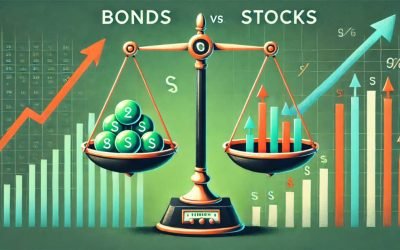Understanding Economic Crises and Their Impact on Investments
Economic crises are inevitable occurrences in the financial world, often characterised by significant downturns in economic activity, high unemployment rates, and plummeting stock markets. These periods of economic instability can be daunting for investors, as they pose substantial risks to investment portfolios. However, with the right strategies and a clear understanding of the economic landscape, it is possible to navigate these turbulent times effectively.
What Constitutes an Economic Crisis?
An economic crisis can be defined as a severe and sudden disruption in the economy, leading to a significant decline in economic activity. These crises can be triggered by various factors, including financial market crashes, natural disasters, geopolitical tensions, and pandemics. The most notable economic crises in recent history include the Great Depression of the 1930s, the 2008 Global Financial Crisis, and the COVID-19 pandemic.
How Economic Crises Affect Investment Portfolios
During economic crises, the value of investments can fluctuate dramatically. Stock markets often experience sharp declines, bond yields may fall, and real estate values can plummet. These fluctuations can lead to substantial losses for investors who are not adequately prepared. Understanding the impact of economic crises on different asset classes is crucial for effective portfolio management.
Strategies for Managing Your Portfolio During Economic Crises
Diversification: The Cornerstone of Risk Management
Diversification is a fundamental strategy for managing risk in any investment portfolio. By spreading investments across various asset classes, sectors, and geographical regions, investors can reduce the impact of a downturn in any single area. Here are some key diversification strategies:
- Asset Class Diversification: Invest in a mix of stocks, bonds, real estate, and commodities to spread risk.
- Sector Diversification: Allocate investments across different sectors such as technology, healthcare, and consumer goods.
- Geographical Diversification: Invest in both domestic and international markets to mitigate regional risks.
Maintaining Liquidity: The Importance of Cash Reserves
During economic crises, having access to liquid assets is crucial. Cash reserves provide a safety net that allows investors to meet their financial obligations without having to sell investments at a loss. Maintaining an adequate cash reserve can also provide opportunities to buy undervalued assets during market downturns.
Rebalancing Your Portfolio: Staying Aligned with Your Goals
Regularly rebalancing your portfolio ensures that it remains aligned with your investment goals and risk tolerance. During economic crises, certain asset classes may outperform others, leading to an imbalance in your portfolio. Rebalancing involves selling overperforming assets and buying underperforming ones to maintain your desired asset allocation.
Investing in Defensive Stocks: Stability in Uncertain Times
Defensive stocks, also known as non-cyclical stocks, tend to perform well during economic downturns. These stocks belong to companies that provide essential goods and services, such as utilities, healthcare, and consumer staples. Investing in defensive stocks can provide stability and reduce volatility in your portfolio during economic crises.
Exploring Alternative Investments: Diversifying Beyond Traditional Assets
Alternative investments, such as hedge funds, private equity, and real assets, can offer diversification benefits and reduce portfolio volatility. These investments often have low correlations with traditional asset classes, making them valuable additions to a well-diversified portfolio. However, it is essential to conduct thorough research and understand the risks associated with alternative investments.
Psychological Aspects of Investing During Economic Crises
Managing Emotions: The Role of Behavioural Finance
Investing during economic crises can be emotionally challenging. Fear and panic can lead to irrational decision-making, resulting in significant financial losses. Understanding the principles of behavioural finance can help investors manage their emotions and make rational investment decisions. Key concepts include:
- Loss Aversion: The tendency to fear losses more than valuing gains.
- Herd Behaviour: The tendency to follow the actions of the majority.
- Overconfidence: The tendency to overestimate one’s knowledge and abilities.
Staying Informed: The Importance of Continuous Learning
Staying informed about economic trends, market developments, and investment strategies is crucial for making informed decisions during economic crises. Regularly reading financial news, attending webinars, and consulting with financial advisors can provide valuable insights and help investors stay ahead of the curve.
Maintaining a Long-Term Perspective: Weathering the Storm
Economic crises are often temporary, and markets tend to recover over time. Maintaining a long-term perspective can help investors stay focused on their financial goals and avoid making impulsive decisions based on short-term market fluctuations. Historical data shows that markets have consistently rebounded from past crises, rewarding patient and disciplined investors.
Case Studies: Learning from Past Economic Crises
The Great Depression: Lessons in Resilience
The Great Depression of the 1930s was one of the most severe economic crises in history. During this period, stock markets crashed, unemployment soared, and many businesses failed. However, investors who remained resilient and continued to invest in quality assets eventually saw significant returns as the economy recovered.
The 2008 Global Financial Crisis: The Importance of Diversification
The 2008 Global Financial Crisis highlighted the importance of diversification and risk management. Many investors who had heavily invested in real estate and financial stocks suffered significant losses. Those with diversified portfolios, including bonds and international assets, were better able to weather the storm and recover more quickly.
The COVID-19 Pandemic: Adapting to New Realities
The COVID-19 pandemic brought unprecedented challenges to the global economy. Investors had to adapt to rapidly changing market conditions and navigate the uncertainties brought about by lockdowns and economic disruptions. The pandemic underscored the importance of flexibility, liquidity, and staying informed about market developments.
Practical Tips for Managing Your Portfolio During Economic Crises
Conducting a Portfolio Review: Assessing Your Current Position
Regularly reviewing your portfolio is essential for identifying potential risks and opportunities. During economic crises, conducting a thorough portfolio review can help you assess your current position and make necessary adjustments. Key steps include:
- Evaluating Asset Allocation: Ensure that your portfolio is well-diversified and aligned with your risk tolerance.
- Identifying Underperforming Assets: Consider selling assets that are consistently underperforming and reallocating funds to more promising investments.
- Assessing Liquidity Needs: Ensure that you have sufficient cash reserves to meet your financial obligations.
Setting Realistic Expectations: Understanding Market Cycles
Setting realistic expectations is crucial for managing your portfolio during economic crises. Understanding that markets go through cycles of growth and contraction can help you stay focused on your long-term goals. Avoid making impulsive decisions based on short-term market movements and remain patient during periods of volatility.
Seeking Professional Advice: Leveraging Expertise
Consulting with financial advisors can provide valuable insights and help you make informed decisions during economic crises. Financial advisors can offer personalised advice based on your unique financial situation and goals. They can also help you navigate complex market conditions and identify potential investment opportunities.
Conclusion: Navigating Economic Crises with Confidence
Managing your portfolio during economic crises requires a combination of strategic planning, emotional discipline, and continuous learning. By diversifying your investments, maintaining liquidity, rebalancing your portfolio, and staying informed, you can navigate these challenging times with confidence. Remember to maintain a long-term perspective and seek professional advice when needed. Economic crises are inevitable, but with the right strategies, you can protect your investments and emerge stronger on the other side.

Q&A Section
Q1: What is the most important strategy for managing a portfolio during an economic crisis?
A1: Diversification is the most important strategy. By spreading investments across various asset classes, sectors, and geographical regions, you can reduce the impact of a downturn in any single area.
Q2: How can I manage my emotions during an economic crisis?
A2: Understanding behavioural finance principles, such as loss aversion and herd behaviour, can help you manage your emotions. Staying informed and maintaining a long-term perspective are also crucial.
Q3: Should I sell my investments during an economic crisis?
A3: Selling investments during a crisis can lock in losses. Instead, consider rebalancing your portfolio and maintaining liquidity to meet financial obligations without selling at a loss.
Q4: What are defensive stocks, and why are they important during economic crises?
A4: Defensive stocks belong to companies that provide essential goods and services, such as utilities and healthcare. They tend to perform well during economic downturns, providing stability and reducing volatility in your portfolio.
Q5: How can I stay informed about market developments during an economic crisis?
A5: Regularly reading financial news, attending webinars, and consulting with financial advisors can help you stay informed about economic trends and market developments.
More reading on the subject:















 How to trade CFD? (00:49)
How to trade CFD? (00:49) How to trade binary options*? (01:22)
How to trade binary options*? (01:22) Forex. How to start? (01:01)
Forex. How to start? (01:01)